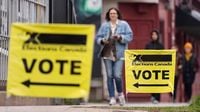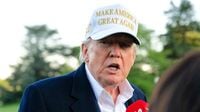As Canada heads into a pivotal parliamentary election, the shadow of U.S. President Donald Trump's recent remarks looms large over the political landscape. On April 28, 2025, Canadians were called to vote amidst a backdrop of Trump's repeated calls for Canada to join the United States as its 51st state. In a post on his social media platform, Truth Social, Trump expressed his desire for Canada to integrate into the U.S., stating, "No more artificial lines drawn many years ago. How beautiful this country would be. Free access without borders. Only positives, nothing negative. So it should always be!" This provocative statement has sparked outrage among Canadian political leaders and citizens alike.
Trump's appeal to the Canadian electorate included urging them to choose a leader who could "halve their taxes and raise military power to the highest level"—implicitly suggesting that he himself would be that leader if Canada were to become a state. He promised, "null tariffs or taxes" would be the reward for such a union, implying that Canada would benefit economically from joining the U.S. However, these claims have been met with skepticism and strong opposition.
Pierre Poilievre, the leader of Canada's Conservative Party, was quick to respond to Trump's comments. On social media, he firmly stated, "President Trump, keep out of our election. Canada will always be proud, sovereign, and independent, and we will never be the 51st state." Poilievre's remarks highlight a national sentiment against foreign interference in Canadian politics, especially from a figure as polarizing as Trump.
The context of these remarks comes as Canadians prepare to vote in an election that could reshape their government. Approximately 29 million eligible voters were summoned to cast their votes, with early voting already seeing over seven million Canadians participating—an unprecedented turnout for advance voting. Polls leading up to the election indicated a tight race, with the ruling Liberal Party, led by Prime Minister Mark Carney, holding a slight edge over the Conservatives. Recent surveys showed the Liberals at 42 to 44 percent, while the Conservatives trailed closely at 38 to 40 percent.
This election is particularly significant as it marks the first major test for Carney, who took over leadership from Justin Trudeau earlier this year amid economic challenges. Carney's government has faced criticism for rising living costs and housing prices, issues that have become central to the election discourse. As the election unfolded, many Canadians expressed concerns about the impact of Trump's tariffs on Canadian exports and the broader implications of his annexation threats.
In Vancouver, the nation was also grappling with a tragic incident that occurred just days before the election, where a driver plowed into a crowd at a Filipino street festival, killing eleven people. This horrific event added to the somber mood of the election, prompting leaders like Carney to extend condolences to the families affected. He remarked, "I want to express my deepest sympathies to all of you and the Filipino community who are experiencing the nightmare of every family." The shock from this incident has influenced the political climate, with many voters seeking stability and strong leadership.
The impact of Trump's statements on the election cannot be understated. His aggressive trade policies and the threat of annexation have galvanized support for the Liberal Party, as many Canadians rally around the idea of national sovereignty. Carney's calm and experienced approach to handling U.S. relations is seen as a counterbalance to Trump's unpredictable nature. A voter in Ottawa expressed this sentiment, saying, "We are concerned about what is happening in the U.S. It is obvious that we need someone who can handle it properly."
As the election unfolds, the Canadian political landscape is charged with the implications of Trump's interference. While the Conservative Party had previously held a significant lead in polls, the recent surge in support for the Liberals suggests that the fear of losing national independence has resonated with voters. The election results, expected to be released on the morning of April 29, 2025, will determine whether the Liberals can maintain their decade-long hold on power or if the Conservatives can capitalize on the growing discontent.
Both major parties are vying for at least 172 seats in the 343-seat House of Commons to achieve a majority. However, with the potential for a minority government, the dynamics of coalition-building may come into play, as smaller parties like the New Democratic Party (NDP) and the Bloc Québécois could hold the balance of power.
As Canadians prepare to make their voices heard at the polls, the words of President Trump serve as a reminder of the delicate balance between domestic policy and foreign influence. The outcome of this election will not only shape Canada's immediate future but also its relationship with its southern neighbor.
In light of these developments, the question remains: will Canadians choose to reinforce their sovereignty, or will they be swayed by the promises of a powerful neighbor? The election results will soon reveal the answer.






